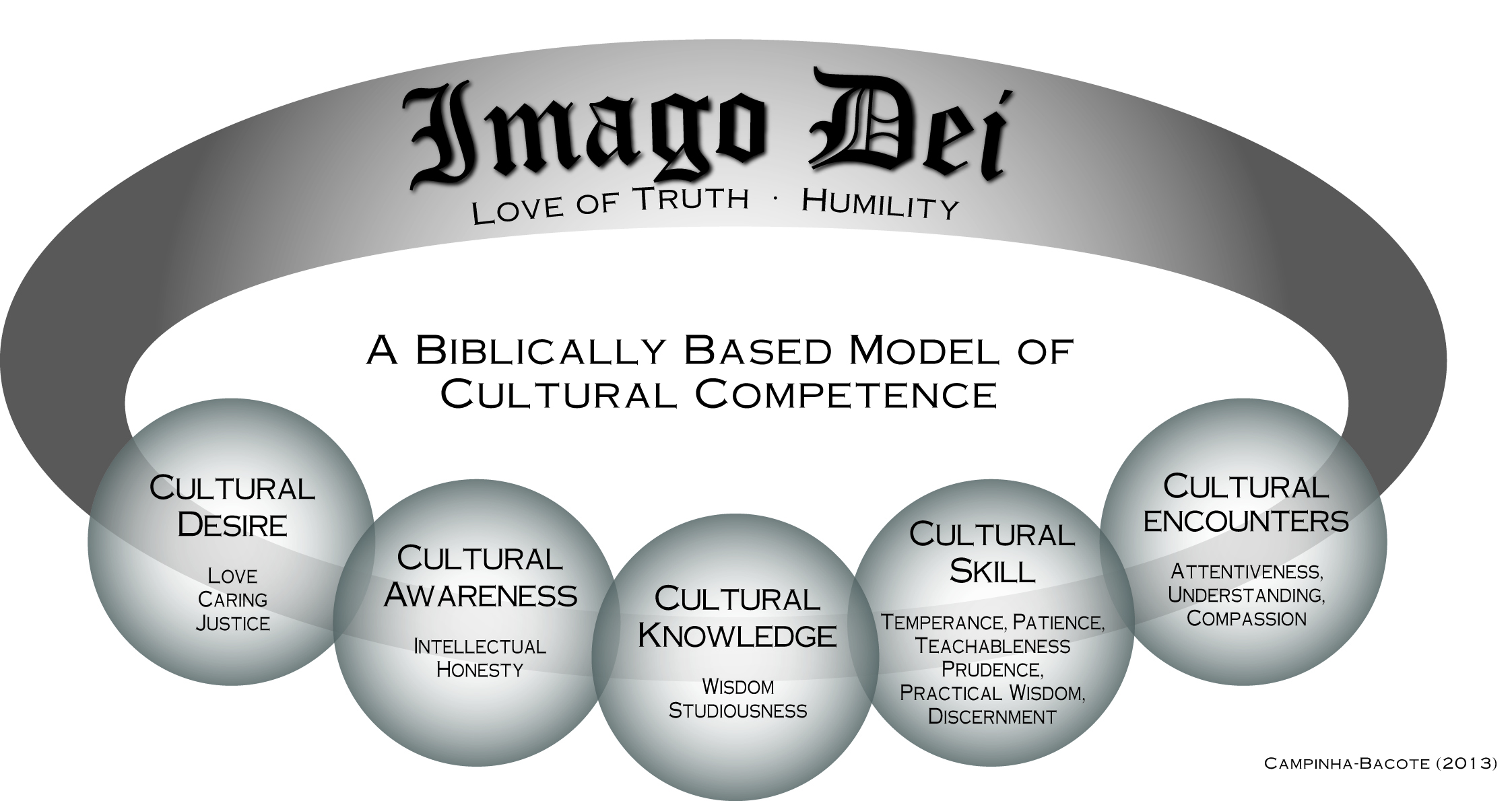A Biblically Based Model Of Cultural Competence
The Biblically Based Model of Cultural Competence in the Delivery of Healthcare Services draws upon the works of Campinha-Bacote (2007; 2018), Leininger & McFarland (2006), Kleinman (1980), Pederson (1988), Law (1993), Wood (1998), Cross et al. (1989), Wilkerson (2002) and Chapman (2005). This model defines cultural competemility as the ongoing process in which the healthcare professional continuously strives to achieve the ability and availability to work effectively within the cultural context of the patient (individual, family, community) from a biblical perspective. This process requires healthcare professionals to see the image of God (“imago Dei”) in their patients. Healthcare professionals must also see themselves as becoming culturally competent rather than being culturally competent as they integrate the biblical virtues of love, caring, humility, love of truth, teachableness, intellectual honesty, wisdom, discernment, justice, prudence, attentiveness, studiousness, practical wisdom, understanding, temperance, patience and compassion into the model’s constructs of “imago Dei,” cultural humility, cultural desire, cultural awareness, cultural knowledge, cultural skill and cultural encounters. Based on this model, the tool Inventory for Assessing a Biblically Based Worldview of Cultural Competence Among Healthcare Professionals was developed (link).
Assumptions Of The Model
►The Bible is the foundation for culturally competent care.
►Absolute “Truth” exists and it exists is the contents of God’s mind.
►The foundational construct of cultural competemility is “Imago Dei” (image of God).
► Intellectual and moral virtues provide the field of transcultural health care with “transcultural truth” that is biblically based.
► Cultural competemility is a process, not an event.
►The process of cultural competemility consists of the interdependent relationship among the constructs of “imago Dei,” cultural desire, cultural awareness, cultural knowledge, cultural skill and cultural encounters and the integration of the intellectual and moral virtues of love, caring, justice, humility, love of truth, teachableness, intellectual honesty, wisdom, discernment, prudence, attentiveness, studiousness, practical wisdom, understanding, temperance, patience and compassion into these constructs.
►Cultural competence is based on a commitment to social justice.
►Cultural competemility is an essential component in rendering effective and culturally responsive care to every patient.
► All encounters are sacred encounters.
►Cultural groups extend beyond a patient’s race, ethnicity or country of origin and are inclusive of cultural groups that are based on religious affiliation, language, physical size, gender, sexual orientation, age, disability, political orientation, socio-economic status, occupational status and geographical location, to name a few.
►There is significant variation (intra-cultural variation) within cultural/ethnic groups as well as across cultural/ethnic groups.
►There is a positive and direct relationship between the healthcare professional’s level of biblical cultural competemility and positive patient outcomes.
The figure below depicts the model’s graphic representation. As illustrated in this graphic representation, there is an interdependent relationship among all constructs with the foundational construct of “Imago Dei” being the key construct that is continuously being infused throughout each of the other constructs.

*Duplication/Copying of A Biblically Based Model of Cultural Competence in the Delivery of Healthcare Services: Seeing "Imago Dei" - A Biblically Based Model of Cultural Competence in the Delivery of Healthcare Services: "Seeing Imago Dei" is copyrighted and therefore cannot be duplicated/copied without written permission from the author, Dr. Josepha Campinha-Bacote, or her designee. Transcultural C.A.R.E. Associates has a policy regarding the unauthorized use of this copyrighted model.
